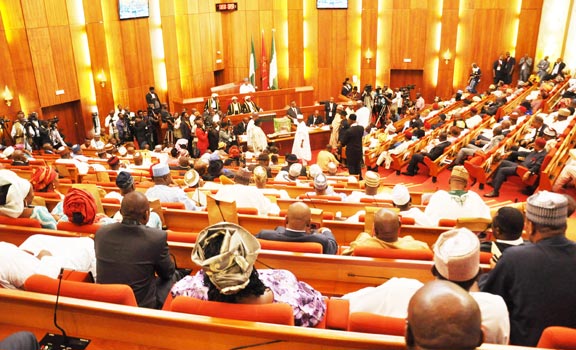 The Nigerian Senate on Wednesday resolved to override President Muhammadu Buhari’s veto on two bills passed by the National Assembly.
The Nigerian Senate on Wednesday resolved to override President Muhammadu Buhari’s veto on two bills passed by the National Assembly.
The bills are the Constitution of the Federal Republic of Nigeria, 1999 (Fourth Alteration No. 28) Bill 2018 and Industrial Development (Income Tax Relief) (Amendment) Bill 2018.
The Fourth Alteration Bill seeks to stipulate the time within which the President or Governor will lay the appropriation bill before the national or state assembly while the Industrial Development Amendment Bill makes provision for companies that expand their operations in pioneer industry or product to apply for a new pioneer status.
The resolution of the Upper Legislative Chamber was sequel to the adoption of recommendations of a technical committee set up to review President Buhari’s decision to decline assent to the bills.
Presenting a report, the Chairman of the Committee, Senator David Umaru argued that Nigeria’s Constitution gives the Senate the right to override the President.
“Therefore, the Bills having been rejected by Mr. President, the National Assembly even if it considers Mr. President’s observations or not, must pass the Bills again and be assented to by Mr. President or override the veto, in which case, Mr. President’s assent would not be required,” Umaru said.
The Committee also recommended that the Senate should reconsider 15 bills rejected by President Buhari, who has so far vetoed over 30 bills passed by the National Assembly since 2015.
Some of the bills to be reconsidered are the Petroleum Industry Governance Bill, 2018; National Institute for Hospitality and Tourism (Establishment) Bill, 2018; National Research and Innovation Council Bill, 2018; Stamp Duties (Amendment) Bill, 2018 and Chartered Institute of Entrepreneurship (Establishment) Bill, 2018 among others.
To override the President, the Senate would need at least two-thirds majority, which is equivalent to at least 73 senators.

NCDC Hosts Emergency Meeting Over Unknown Illness In Sokoto And Zamfara States
Air Peace Expands Route Options For Lagos-London Service
BREAKING: EFCC Declares Former Kogi State Governor, Yahaya Bello, Wanted
Kano High Court Affirms Suspension of APC’s Abdullahi Ganduje Pending Hearing